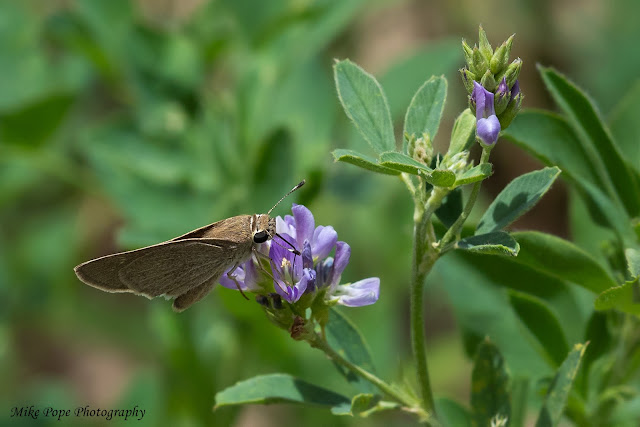And in the blink of an eye another weekend is upon us.
Working from home has become the new norm and with the available tools, we are as productive as ever and seem to be working even longer hours. So, when Friday arrives I head back to the Pivots to avoid any onset of cabin fever.
It was already quite hot at 6:30 in the morning and heat haze was already a factor. However, it didn't stop this resident Crested Lark singing to its heart's content
 |
| Crested Lark (Galerida cristata) |
I headed back to the small pool from last week, but it had less water in today. I assume the Temminck's Stint was the same that I saw last week.
 |
| Temminck’s Stint (Calidris temminckii) |
Wood Sandpiper's are still present in fair numbers
 |
| Wood Sandpiper (Tringa glareola) |
And there was a Common Snipe sitting quietly in the cover on the side of the pool
 |
| Common Snipe (Gallinago gallinago) |
I then checked the marsh and was harassed by the White-tailed Lapwing
 |
| White-tailed Lapwing (Vanellus leucurus) |
Red-wattled Lapwing
 |
| Red-wattled Lapwing (Vanellus indicus) |
and the Black-winged Stilt's
 |
| Black-winged Stilt (Himantopus himantopus) |
which in turn put up a Ruff
 |
| Ruff (Philomachus pugnax) |
I saw a Tern flying low above the marsh, I was hoping for Black at this time of year, but unfortunately it was White-winged
 |
| White-winged Tern (Chlidonias leucopterus) |
There were a few Blue-cheeked Bee-eaters hunting over the reeds. I got this one with a fairly large locust and was really irritated at myself when I missed the mid-air flip of the locust. In my defense, hand-holding the older 600mm prime for prolonged periods, is not as easy as it used to be...
 |
| Blue-cheeked Bee-eater (Merops persicus) |
I then had a drive around some of the fields and boundary fence where I had this Blue-throated Agamid high on the fence to escape the heat on the ground
 |
| Blue-throated (Blanford's) Agamid (Trapelus ruderatus fieldi) |
A little further along, a Lesser Grey Shrike on the same fence, but against the light
 |
| Lesser Grey Shrike (Lanius minor) |
In the Tamarix Trees, there are hundreds of House Sparrows nesting, here Dad has the responsibility of feeding the young. Note the distinctive white cheeks on the male, probably a Indian House Sparrow
 |
| Indian House Sparrow (Passer d. indicus) |
Spotted Flycatcher's also enjoy this habitat
 |
| Spotted Flycatcher (Muscicapa striata) |
Around the fields, more Red-backed Shrikes
 |
| Red-backed Shrike (Lanius collurio) |
And a Blue-cheeked Bee-eater that landed close to my car and breathing hard to regulate it's temperature
 |
| Blue-cheeked Bee-eater (Merops persicus) |
Not far off were a pair of Namaqua Dove's - but heat haze killed the image
 |
| Namaqua Dove (Oena capensis) |
Driving along the boundary fence, I surprised a Desert Monitor and I managed this grab shot as it literally dived into cover
 |
| Desert Monitor (Varanus griseus) |
On the way to the palm plantation, another Blue-throated Agamid trying to get some air flow between its body and the ground
 |
| Blue-throated (Blanford's) Agamid (Trapelus ruderatus fieldi) |
At the palm plantation, I found a family of White-eared Bulbul and this recently fledged youngster
 |
| White-eared Bulbul (Pycnonotus leucotis) |
Before leaving, I decided to walk along one of the pivot fields with flowering Alfalfa and it was a great decision
Aside from this Erebidae Moth species
 |
| Erebidae sp. |
I discovered another new butterfly for Kuwait, this time a Pygmy Skipper and thanks to Steve Collins for confirming the ID. If you are familiar with Skippers, they are extremely fast flying and wary and are easily lost to sight if you dont see where they go. It took a good 45-minutes to get these images, but well worth the effort. The amount of times I lay flat only to find it had flown off became a joke, but the perseverance paid off eventually
 |
| Pygmy Skipper (Gegenes pumilio), a 1st for Kuwait |
 |
| Pygmy Skipper (Gegenes pumilio) and Asian Grass Blue (Zizeeria karsandra) |














No comments:
Post a Comment